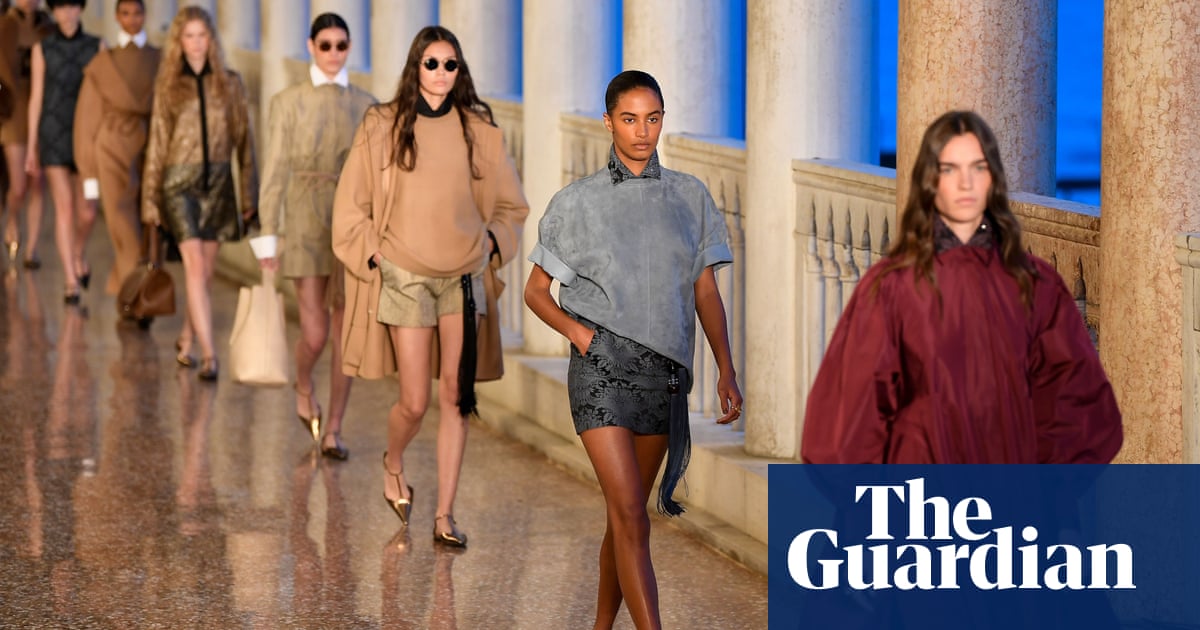While quiet luxury has been the stand on which fashion brands have raced to hang their hats over the past two years, Max Mara’s creative director, Ian Griffiths, took a defiantly celebratory stance with the collection he unveiled in Venice on Tuesday evening.
“Quiet luxury has reached [such] epidemic proportions it’s a total silence, no one’s saying anything,” said Griffiths before the show. “I’ve always slightly objected to the idea of quiet luxury anyway because I don’t know how quiet it is. How quiet is it to walk into a room wearing head to toe total camel?”
Presented in the porticos of the Palazzo Ducale overlooking St Mark’s Square, the resort collection was rich in Max Mara’s signature shade of camel but in a departure from simplicity came sequins, embellished with brocades and in shimmering Jacquard silks, evoking the lavish Fortuny fabrics famous in the lagoon, which Griffiths called “the birthplace of luxury”.
Inspired by Marco Polo, the Venetian merchant who documented accounts of his travels in Mongolia, China, India and Africa, Griffiths staged the show on the 700th anniversary of his death to celebrate the city as “the creator of this gigantic global empire of trade [and] the beauty of cross-cultural contaminations between cultures you find here”.
While referencing the gilded history, a costume drama it was not, according to Griffiths. “The whole point is to create a modern wardrobe,” he said, adding: “Venice style is not always as over the top as you think.”
This materialised in mini embroidered shift dresses, sharp tailoring, chunky knits and open-neck shirts with sporty necklines, many of which were cinched at the waist with woven tassel belts riffing off the sartorial accessories that appear in the paintings of Venetian masters Titian and Tintoretto. They were joined by the sweeping camel coats Max Mara has made its MO over the last seven decades and which new generations of fans continue to aspire to own.
“I genuinely wear their coat all winter,” said the British television presenter and model Alexa Chung from the front row, adding that MaxMara “is a no-brainer, problem-solving, gorgeous, perennial [brand]”.
Griffiths, who marks 37 years at the 75-year-old Reggio Emilia-based brand this year, is one of a handful of designers at luxury fashion houses who can boast an illustrious tenure as well as a firm grip on what they future holds for the brand. That, he says, lies in growing its younger audience.
“For my own sanity, I want to speak to young people, I feel much happier speaking to younger people and people my own age certainly,” he said.
after newsletter promotion
A former club kid in 1980s London, Griffiths has never lost the creative enthusiasm of his youth. Here, he referenced it directly for the first time by working with a textile graduate to replicate the prints based on his sketchbook from 1985 when he was an art student at Manchester Polytechnic. He also realised a lifelong ambition of working with the milliner Stephen Jones who was his idol at the time.
Their presence served as a reminder of the importance of timelessness that Griffiths and Max Mara are two of the most famous arbiters of.
“It’s good to be fashionable, but what happens if you’re not? If you have a product which has relevance, whether or not it’s fashionable, then you’re in a much healthier place,” he said. “It isn’t just about being successful over the next 18 months or five years; our future lies in being consistently desirable with an element of fashionable. For the whole brand to suddenly jump from the from one boat into the fashion boat would be a mistake. It’s not where we came from, it’s not what we’re about and it’s a very, very dangerous game over the long run.”

